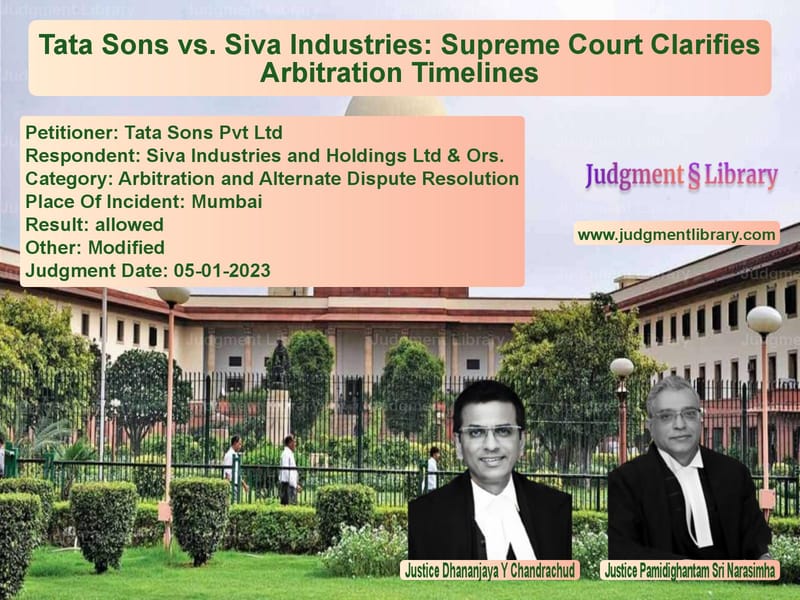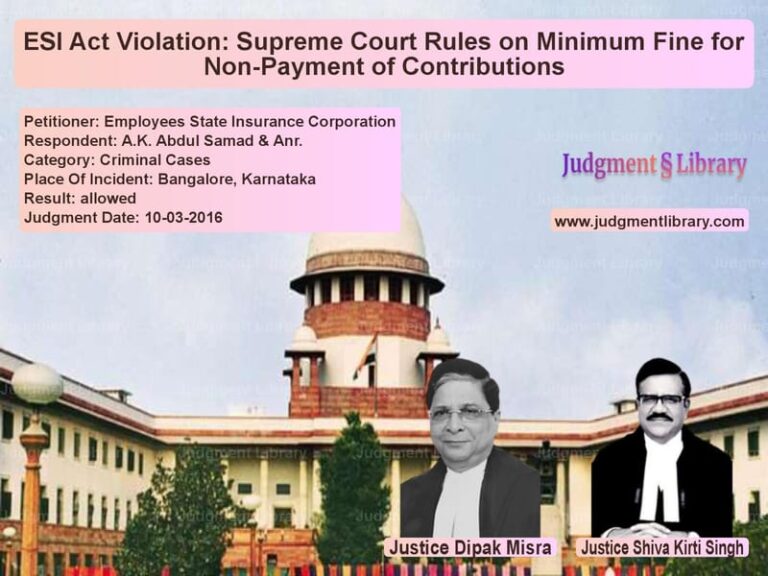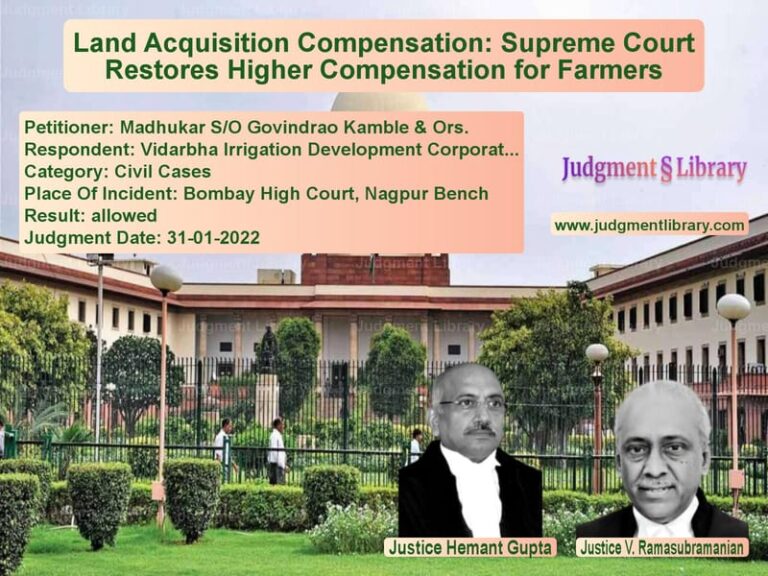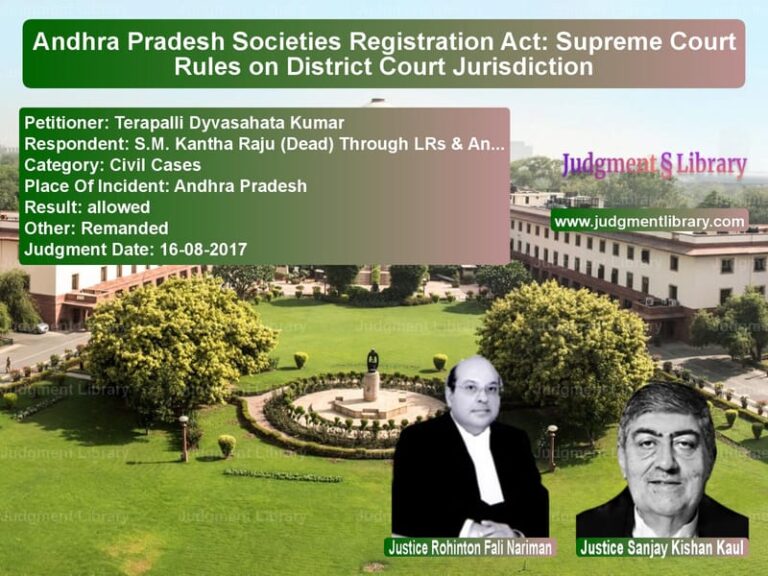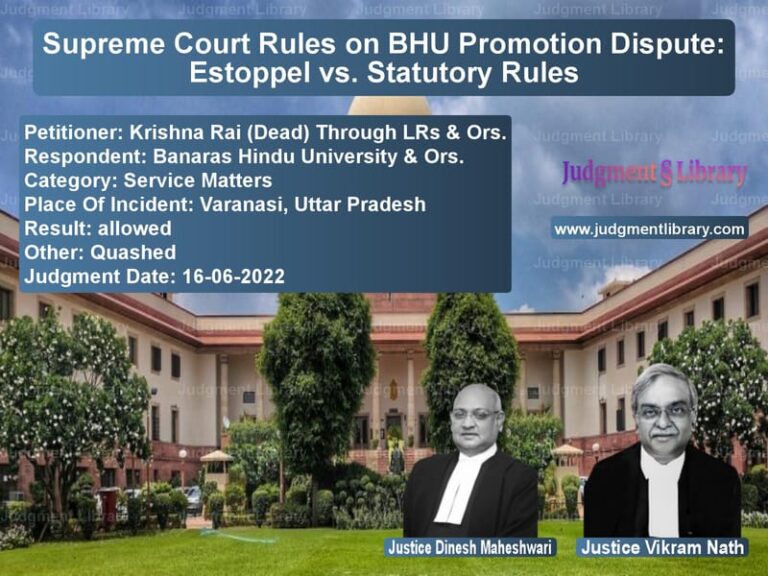Tata Sons vs. Siva Industries: Supreme Court Clarifies Arbitration Timelines
The legal dispute between Tata Sons Pvt Ltd and Siva Industries and Holdings Ltd revolves around the enforcement of an arbitration agreement and the impact of amendments to the Arbitration and Conciliation Act, 1996. The Supreme Court’s decision in this case provides clarity on arbitration timelines, particularly in international commercial arbitration.
The primary issue in this case was whether the arbitration proceedings between the parties could continue beyond the prescribed statutory timeline under Section 29A of the Arbitration Act. The case also dealt with the impact of insolvency proceedings on arbitration and the applicability of amendments made to arbitration laws in India.
Background of the Case
The dispute traces back to agreements between Tata Sons, Siva Industries, and other entities regarding shareholding in Tata Tele Services Ltd (TTSL). The key events are:
- On 24 February 2006, a share subscription agreement was executed between Tata Sons, TTSL, and Siva Industries.
- On 12 November 2008, NTT Docomo, a Japanese company, entered into an agreement with Tata Sons to acquire a 26% stake in TTSL.
- On 3 March 2009, Docomo acquired over 20.7 million shares of TTSL from Siva Industries.
- On 25 March 2009, a Shareholders’ Agreement was executed to outline the rights and obligations of the parties, including a clause that required Siva Industries to buy back shares if Docomo exercised a sale option.
In July 2014, Docomo exercised its right to sell its shares, triggering a dispute when Tata Sons was required to acquire the shares. Tata Sons, in turn, called upon Siva Industries to proportionally purchase its shareholding, as per the agreement.
Arbitration and Insolvency Proceedings
With disputes arising, Docomo invoked arbitration in the London Court of International Arbitration (LCIA), leading to an award against Tata Sons in June 2016. Tata Sons, in turn, initiated arbitration against Siva Industries under an Inter se Agreement, invoking the arbitration clause in June 2017. The arbitration seat was Mumbai, with courts in Mumbai having exclusive jurisdiction.
Despite notices, the respondents did not appoint their arbitrator. As a result, Tata Sons approached the Supreme Court under Section 11(6) of the Arbitration Act for the constitution of an arbitral tribunal. On 17 January 2018, the Supreme Court appointed Justice S N Variava as the sole arbitrator.
During the arbitration process:
- April 2018: Tata Sons filed its statement of claim.
- June 2018: Siva Industries filed its statement of defense.
- October 2018: Witness examinations were conducted.
However, in July 2019, IDBI Bank initiated insolvency proceedings against Siva Industries under the Insolvency and Bankruptcy Code (IBC). This led to a moratorium on all legal proceedings against Siva Industries, including the arbitration.
Supreme Court’s Examination of Arbitration Timelines
With the arbitration process delayed due to insolvency, Tata Sons sought an extension of the arbitral tribunal’s mandate beyond the prescribed period under Section 29A of the Arbitration Act. The key legal questions were:
- Whether the amended Section 29A, which excludes international commercial arbitration from mandatory time limits, applies retrospectively?
- Whether an extension could be granted to complete the arbitration?
Petitioner’s Arguments (Tata Sons)
- As per the 2019 amendment to the Arbitration Act, the mandatory 12-month timeline under Section 29A does not apply to international commercial arbitration.
- Since the arbitration was an international commercial arbitration (with a foreign party involved), it should be exempt from the time restrictions.
- The amendment should apply retrospectively, allowing the arbitration proceedings to continue.
- Alternatively, even if the amendment was deemed inapplicable, the court should grant an extension to allow the tribunal to conclude the proceedings.
Respondent’s Arguments (Siva Industries)
- The amendment should not be applied retrospectively, as it was not explicitly stated in the law.
- Without a statutory time limit, international commercial arbitrations could remain pending indefinitely, undermining judicial oversight.
- Even if arbitration is exempt from time limits, procedural fairness requires that courts exercise control over the duration of arbitration proceedings.
Supreme Court’s Judgment
The Supreme Court ruled in favor of Tata Sons, clarifying key aspects of arbitration law:
- International Commercial Arbitration Exempt from Mandatory Timelines: The court held that after the 2019 amendment, the 12-month limit under Section 29A does not apply to international commercial arbitration.
- Retrospective Application: Since the amendment was procedural and remedial, it applied retrospectively to pending arbitration proceedings.
- Arbitration Tribunal’s Authority to Extend Time: The arbitrator had jurisdiction to extend the arbitration period and issue procedural directions.
- Arbitration Continues Despite Insolvency: As the insolvency proceedings against Siva Industries had ended in June 2022, the arbitration could resume.
Key Observations from the Judgment
The Supreme Court made significant observations regarding arbitration law:
- “The process of arbitration in international commercial disputes should not be rigidly bound by the timelines applicable to domestic arbitrations.”
- “The amendments to Section 29A, being procedural and remedial in nature, apply to all pending arbitrations as of 30 August 2019.”
- “Arbitral tribunals in international commercial arbitration are expected to expedite proceedings but are not legally bound to conclude them within 12 months.”
- “Judicial intervention in arbitration timelines should be minimal to ensure autonomy of the arbitration process.”
Final Decision
The Supreme Court ruled in favor of Tata Sons and allowed the arbitration to continue. The judgment confirmed:
- The arbitration tribunal could proceed without requiring further court intervention.
- The amended law applies to all international commercial arbitrations that were pending as of 30 August 2019.
- The arbitrator had full authority to extend the arbitration proceedings beyond statutory timelines.
- The moratorium under the IBC had ended, and arbitration proceedings could now resume.
This landmark ruling clarifies that arbitration in international disputes should not be constrained by rigid statutory timelines and highlights the importance of procedural flexibility in commercial arbitration.
Petitioner Name: Tata Sons Pvt Ltd.Respondent Name: Siva Industries and Holdings Ltd & Ors..Judgment By: Justice Dhananjaya Y Chandrachud, Justice Pamidighantam Sri Narasimha.Place Of Incident: Mumbai.Judgment Date: 05-01-2023.
Don’t miss out on the full details! Download the complete judgment in PDF format below and gain valuable insights instantly!
Download Judgment: tata-sons-pvt-ltd-vs-siva-industries-and-supreme-court-of-india-judgment-dated-05-01-2023.pdf
Directly Download Judgment: Directly download this Judgment
See all petitions in Arbitration Awards
See all petitions in International Arbitration
See all petitions in Enforcement of Awards
See all petitions in Judgment by Dhananjaya Y Chandrachud
See all petitions in Judgment by P.S. Narasimha
See all petitions in allowed
See all petitions in Modified
See all petitions in supreme court of India judgments January 2023
See all petitions in 2023 judgments
See all posts in Arbitration and Alternate Dispute Resolution Category
See all allowed petitions in Arbitration and Alternate Dispute Resolution Category
See all Dismissed petitions in Arbitration and Alternate Dispute Resolution Category
See all partially allowed petitions in Arbitration and Alternate Dispute Resolution Category

